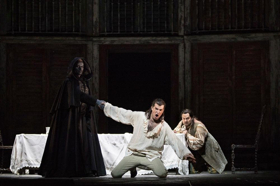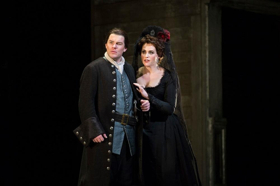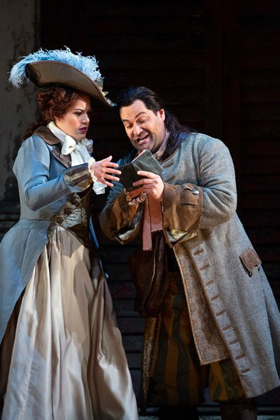Review: Debuts Galore at Met's First DON GIOVANNI of the Season, But Willis-Sorensen's Anna Steals the Show

Kocan in shadows. Photo: Marty Sohl/Met Opera
According to a quote attributed to Andy Warhol, if you want to tell a good painting from a bad one, first look at a thousand paintings; then you'll realize that there are no hard and fast rules. When it comes to performing arts and traditional repertoire, the standards are a little different.
Directors, designers and cast are expected to add their two cents to what the creators did in putting pen to paper, steps to dance or notes to symphony. It's part of their assignments today to show their smarts and insights (or at least come up with something they think will be more meaningful to modern/younger audiences). Mozart and his librettist Lorenzo da Ponte were victims of this maneuvering in the Met's DON GIOVANNI, which had its season premiere the other night.
In this case, what we get is one of Mozart's most ravishing scores--the arias, the ensembles, even the dances!--sometimes gorgeously sung (sometimes less), set in one of the Met's ugliest productions. Michael Grandage, the esteemed British theatre director, appeared to have run out of steam--or ideas--with his head designer, Christopher Oram providing a set that, for the most part, crammed the action along the apron of the stage. For a stage the size of the Met's to use so little of its real estate during the bulk of this opera was unfathomable.

Barbeyrac. Photo: Marty Sohl/Met Opera
Luckily, there was the debut of German conductor Cornelius Meister to move things elegantly along and some performers who knew their Mozart style, even if the director didn't. (I'm not sure Louisa Miller, who helmed the revival, could have done much with the carcass set before her.) The Met orchestra was in fine form, giving a first-rate account of the heavenly score, with David Heiss (cello) and Howard Watkins (harpsichord) providing excellent continuo work and Joyce Rasmussen Balini nimbly handling the mandolin solo.
The top of my list the evening's pleasures was the Donna Anna of soprano Rachel Willis-Sorensen, who sounded great from beginning to end ("Non mi dir" was a pleasure) and was given the best costumes in Oram's trunk, though I wished she hadn't added unnecessary ornamentation. Bass-baritone Luca Pisaroni's Don sounded fine but was not nearly charismatic enough to pull off his assignment (he's been a better Leporello), while bass Ildar Abdrazakov was a thoroughly lively Leporello--the Don's faithful servant and scapegoat. Abdrazakov sounded a bit worn, though it didn't affect the effectiveness of the Catalogue aria. This time of year being what it is--flu and other ailments rampant in the city--I'd give him and the three singers making their house debuts the benefit of the doubt.

Photo: Marty Sohl/Met Opera
Of the three newcomers, soprano Federica Lombardi was the most appealing; her entrance aria was delightful, even with the awful staging and matronly dress, and she pulled off "Mi tradi" with aplomb. The other two debutants may have been casualties of their unfamiliarity with the Met's acoustics and size: Soprano Aida Garifullina came with some buzz, but I found her Zerlina not particularly appealing and somewhat shrill as she pressed for volume; while tenor Stanislas de Barbeyrac was not the stick Don Ottavio can sometimes be, his voice tended to spread when pushed during his two arias, "Il mio tesoro" and "Dalla sua pace."
Rounding out the cast were bass Stefan Kocan as the vibrant, younger-than-usual Commendatore, who is charged with giving the Don his much-deserved comeuppance as the opera neared its end (finally using more than a bit of the Met's huge stage), and bass-baritone Brandon Cedel as Zerlina's intended, Masetto.
As for DON GIOVANNI in the age of #MeToo, this is a tough nut to crack without throwing out the baby with the bathwater. The Met seems to have changed some of the staging to make the roue a bit less offensive, while other times seeming to delete stretches of titles that might be problematic. But what do you do with "Batti, batti," even if it is delivered with a smile? Is it time to go back to the days before supertitles and subtitles, when we didn't know everything that was going on in the libretto?
Reader Reviews
Videos

